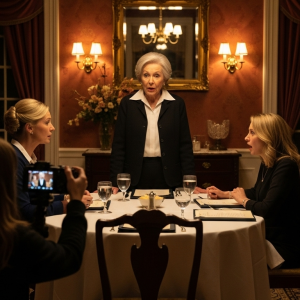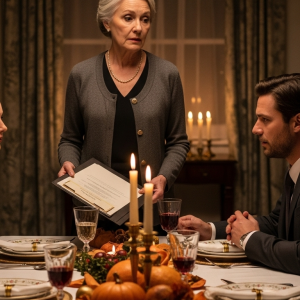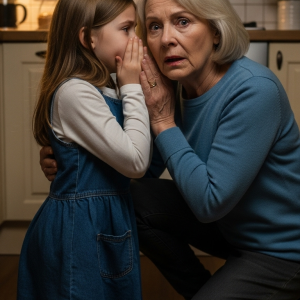For five years, I was Héctor’s wife. And for five years, my heart withered a little more each day. It wasn’t a death by a thousand cuts, but a slow, creeping frost. Héctor was never violent or loud. His cruelty was a quieter, more insidious kind—the chilling indifference in his eyes, the cold dismissal in his voice. It was an apathy that made me feel like a ghost in my own life.
After our wedding, I moved into his family’s imposing house in a wealthy neighborhood of Mexico City. It was a world away from the vibrant, sun-drenched streets of the small town in Oaxaca where I was raised. This house was grand and silent, filled with dark, heavy furniture and the disapproving presence of his mother, who made it clear from day one that I was not the daughter-in-law she would have chosen.
My days fell into a rigid, lonely routine. I would wake before dawn, the silence of the large house pressing in on me. I would cook breakfast, the aroma of coffee filling a kitchen where no one ever sat to share a cup with me. I would do the laundry, clean the cavernous rooms, and prepare dinner, all under the watchful, critical eye of my mother-in-law.
Every evening, I would sit at the large, polished dining table, a carefully prepared meal growing cold in front of me, and wait for him to come home. More often than not, he would walk in late, tossing his keys onto the credenza without a glance in my direction. “I already ate,” he would say, his voice flat, before disappearing into his study.
I often wondered if this marriage was any different from being a well-kept servant. I tried to build a bridge across the chasm between us. I tried to love him, to find the man I thought I had married. But all I ever received in return was an invisible, unfillable void. The woman I was—the girl who loved to paint, who laughed easily, who dreamed of teaching—had slowly faded, replaced by this quiet, waiting woman who no longer recognized herself.
I remember one night, I was struck by a terrible stomachache, curled up in bed, my body wracked with pain. I called out for him, my voice a weak whisper. He opened the bedroom door, stood in the frame for a moment, and said, “There are painkillers in the bathroom cabinet,” before closing the door and leaving me to endure the night alone. That was the night I truly understood I was on my own.
Then, one cool Tuesday evening, Héctor came home earlier than usual. His face was a cold, blank mask. He sat down opposite me at the dining table where my uneaten dinner still sat. He slid a folded document across the polished wood.
“Sign it,” he said, his voice as dry as dust. “I don’t want to waste any more of our time. This arrangement is no longer beneficial.”
I froze, but deep down, I wasn’t surprised. The end had been coming for a long time. It had just been waiting for a formal announcement. With tears welling in my eyes, I took the pen he offered, my hand trembling. All the memories of those lonely dinners, of the nights I was sick and alone, of the countless small kindnesses I had offered that were met with cold indifference—they all came flooding back, each one a fresh, deep cut. I signed my name, my signature a shaky, tear-blurred line.
After signing, I went upstairs to pack my things. It was a swift, simple task. There was almost nothing in this grand, cold house that truly belonged to me, except for a few changes of clothes and the old, lumpy pillow I had slept with every night.
It was the pillow I had brought with me from my mother’s home in Oaxaca when I first came to the city for university. It had been my constant companion, and I had insisted on keeping it when I became Héctor’s wife because I had trouble sleeping without its familiar comfort. He had often grumbled about it, calling it a “peasant’s pillow,” a shabby reminder of my humble origins. But I had clung to it.
As I was pulling my small, worn suitcase toward the front door, my mother-in-law watched from the top of the stairs, her face a mask of smug satisfaction. Héctor stood by the door, his arms crossed. He pointed at the pillow tucked under my arm.
“Don’t forget your trash,” he said, his voice laced with a final, parting sneer. He then reached out, snatched the pillow from me, and threw it onto the doorstep outside. “Take your rags with you. Go on, wash it. It’s probably about to fall apart, just like you.”
I flinched as if he had struck me. I looked at the pillow lying on the cold stone. It really was old; the pillowcase was faded and thin, marked with the faint, yellowed stains of time and my own quiet tears. The seams were frayed in places. It looked pathetic, a perfect symbol of the life I was leaving behind.
My heart constricted with a pain so sharp it took my breath away. I didn’t say a word. I simply bent down, picked up the pillow, and walked out of that house without a backward glance. I left his world in silence, just as I had lived in it.
Back in the small, one-room apartment I had managed to rent, I sat dazed on the edge of the hard mattress, looking at the pillow in my lap. Héctor’s sarcastic words echoed in my ears. “Wash it.” Thinking about his sneer, a sudden, fierce resolve took hold of me. I would wash it. I would wash away every last trace of him, of that house, of those five wasted years. I would sleep on a clean pillow tonight, and I would not dream of painful memories.
As I unzipped the faded, worn pillowcase, my fingers brushed against something strange inside. Beneath the soft, lumpy cotton fluff, there was a firmness, a crinkling texture that didn’t belong. My heart began to beat a little faster. I reached my hand deep into the pillow’s stuffing and my fingers closed around a small, plastic-wrapped bundle.
I pulled it out and stopped dead. It was a small, neat package, wrapped very carefully in a nylon bag to protect it from moisture. With trembling hands, I peeled away the plastic. Inside was a thick stack of money, all crisp 500-peso bills, bound together with a rubber band. Tucked within the bills was a piece of paper, folded into a neat square.
My hands shook so badly I could barely unfold the paper. My mother’s familiar, slightly shaky handwriting appeared before my eyes.
“My dearest daughter, my Sofia,” the letter began.
“If you are reading this, it means your heart is hurting, and for that, my own heart breaks. This is the money I have saved for you over the years, a little from my sewing, a little from the market, in case you ever faced hardship. I hid it in this pillow because I know your pride, and I was afraid you would be too proud to take it if I offered it to you outright. It is not much, but I pray it is enough to give you a new start.
Listen to me, my child. No matter what has happened, do not suffer for a man who does not see the sun in you. Your worth is not measured by any man’s love, or his lack of it. You are my daughter, and you are made of strength and light.
I love you more than all the stars in the sky.”
My tears fell like a heavy rain onto the yellowed paper. I remembered my wedding day so clearly now. My mother, pressing the pillow into my hands, saying, “This one is very soft, my love. It will help you sleep well.” I had laughed and hugged her, dismissing her sentimentality. “Oh, Mama,” I had said, full of a naive, youthful confidence. “Héctor and I will be happy. I won’t need it.”
I remembered the look in her eyes then—a distant, sad wisdom that I had been too young and too in love to understand. I hugged the pillow to my chest now, burying my face in its worn fabric, and I could almost smell the faint scent of my mother’s kitchen, of woodsmoke and marigolds. I could almost feel her sitting beside me, stroking my hair and comforting me, as she had done when I was a little girl.
It turned out she had always known. She had seen the truth of Héctor’s character, had understood the risks a daughter takes when she gives her heart to the wrong man. It turned out she had prepared a lifeboat for me, not a wealthy one, but one built of pure, unconditional love, a lifeboat that would keep me from drowning in despair.
That night, I lay on the hard, unfamiliar bed in my small, empty room, holding the pillow tightly to my chest. My tears soaked the old, faded pillowcase. But for the first time in five years, I wasn’t crying because of Héctor. I was crying out of a profound, overwhelming love for my mother.
I cried for her quiet wisdom, for her selfless sacrifice in saving every spare peso for me. I cried because I felt so incredibly lucky, because in my moment of absolute desolation, I had discovered I was not alone. I still had a place to go back to, a mother who loved me fiercely, and a big, wide world out there waiting to welcome me home.
The money, I counted it later, was enough. It was enough for a few months’ rent, enough to buy a train ticket back to Oaxaca, enough to breathe. But it was the letter, her words, that was the real treasure. It was the permission I needed to stop grieving a love that was never real and to start building a life that was my own.
Héctor’s final, cruel act—throwing the pillow at me—had been intended to be my ultimate humiliation. Instead, he had unknowingly thrown me the very key to my freedom. The irony was so profound, it almost made me laugh through my tears. He had dismissed this pillow as a worthless, peasant rag, but it contained more value, more genuine love and worth, than his entire grand, cold house.
The next morning, I woke up early. The sun was streaming through the single window of my small room, and for the first time in a long time, I didn’t feel a sense of dread. I felt a flicker of hope. I carefully folded my mother’s letter and tucked it safely away. I smoothed out the banknotes and placed them in my wallet. Then, I put the pillow in my suitcase, not as a sad reminder of the past, but as a precious symbol of my future.
I looked at myself in the small, cracked mirror on the wall. A woman with swollen, red-rimmed eyes stared back at me. But behind the sadness, I could see a spark. A resilience I had forgotten I possessed.
I told myself that this woman, from this day forward, would live for herself. She would live for her aging mother back home in Oaxaca, who deserved to be cared for with the same love she had so freely given. And she would live for all the unfinished dreams of her youth—the paintings she had never painted, the classes she had never taught.
That marriage, that cold house, that final, sneering insult… all of it was just the end of a sad, painful chapter. But my life was a book, and there were still so many new, unwritten pages waiting. Pages that would be filled not with silence and waiting, but with color, with laughter, with purpose. Pages that would be written by my own resilient, loving, and finally, free hands.




